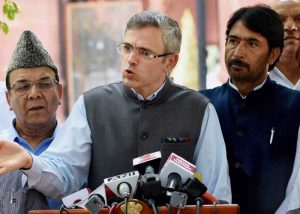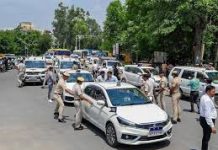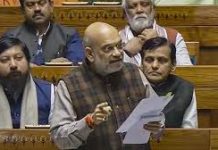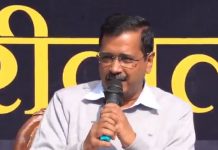 As the BJP and its allies virtually swept through the country, it didn’t fall behind in J&K too, India’s only Muslim majority state. The party secured three of the six seats in the state, repeating its 2014 performance, its best in the state.
As the BJP and its allies virtually swept through the country, it didn’t fall behind in J&K too, India’s only Muslim majority state. The party secured three of the six seats in the state, repeating its 2014 performance, its best in the state.
What is more, the party’s vote share enhanced to 46.4 per cent from 34.40 in 2014. The percentage showed that the BJP led in 27 out of 41 assembly seats in these three parliamentary constituencies.
BJP leader and Union Minister Jitendra Singh won by 3.57 lakh votes defeating Congress’ Vikramaditya Singh, the son of Jammu and Kashmir’s last prince Karan Singh.
Congress party itself, already reduced to a marginal player in the state lost from all the five seats it contested, polling just 1,011,527 votes which made a 28.5 per cent share of total votes polled.
The National Conference bagged all the three seats in the Valley, where polls were largely boycotted by the people on the appeal from the separatist political and militant groups . The NC was contesting only three seats from the Valley having left other three for its alliance partner Congress which couldn’t convert it into victory.
The BJP fell short in Kashmir Valley, though, managing to get only 2.96 per cent of votes which is slightly higher than 1.33 per cent as compared to the 2014 polls.
NC versus BJP
The poll outcome has split J&K between the BJP and the NC, setting stage for a tough contest between them in the Assembly election which is likely to be held later this year. The scenario thus appears a repeat of the run up to 2014 polls which too had split J&K between two parties – that time it was the BJP and the PDP. The two parties went on to rule J&K in a coalition for close to three and a half years when the BJP suddenly withdrew support to the then Chief Minister Mehbooba Mufti and the government fell.
The history looks set to repeat itself. The NC and the BJP are two major players on the scene. But while the NC’s bid is backed by its growing support base in Kashmir Valley and in parts of Jammu, the BJP is banking on a consolidation of Hindu vote plus a play of some incidental political factors to its favour – one of them being the division of Muslim vote bank along sectarian and ethnic lines, like Shia and Sunni and Gujjar, Pahari and Kashmiri respectively.
The PDP and Congress have made their own calculations but they currently enjoy little public confidence. More so, in case of the PDP whose Lok Sabha campaign was weighed down by a strong anti-incumbency sentiment bordering on a mass rejection of the party. Former Chief Minister and the PDP president Mehbooba Mufti was reduced to a third position in the outcome of the election to the Anantnag parliamentary constituency. In 2014, Mufti won the seat by defeating Congress’s candidate by a margin of 12,000 votes.
Boycott factor
One important aspect of the Lok Sabha election in J&K is the widespread boycott of the exercise in Kashmir Valley. The election to three parliament constituencies in the Valley witnessed low to moderate polling. The election to the troubled Anantnag constituency which was spread over three phases recorded an overall turnout of a meagre 8.76 per cent. In Srinagar constituency, it was a little higher at around 15 percent and in North Kashmir’s Baramulla constituency the turnout was reasonably better at 35 percent. Cumulatively, the turnout in the entire Valley is around 17 percent. And this effectively meant that more than 83 percent of people stayed away from the electoral process.
Political pundits in the Valley blame the boycott for distorting the election outcome in the Valley. And they are right. In the recent Panchayat elections, the BJP won a number of wards in South Kashmir, the Valley’s separatist hub.
This doesn’t augur well for the Valley-focussed mainstream parties. Just in case the boycott turned out to be as sweeping as it did in Panchayat and Parliament polls, the BJP could even open its score in the Valley in Assembly polls. In that case, the BJP could even turn out to be a majority partner in the likely new coalition government in the state.
Before Assembly polls
However, before the Assembly elections get underway, Kashmir is seized with a mortal fear of the BJP going ahead with implementing its ideological agenda on the state.
Though,J&K has always been an issue in India’s national polls, this time it acquired a resonance unlike anytime in the past. With the BJP making national security its central poll plank following the Pulwama attack which killed 40 CRPF personnel and triggered skirmishes with Pakistan, the issues related to J&K moved to the centre-stage. The ruling party aggressively brought up the situation in the state to drum up public support. From the prime minister Narendra Modi on down to home minister Rajnath Singh, finance minister Arun Jaitley to Shah himself, the BJP was unrelenting on Kashmir in its campaign rhetoric.
Not only that, unlike the Congress and the other opposition parties, the BJP’s top leaders comprising PM Modi, Singh and Shah – the party’s veritable triumvirate – also visited J&K to deliver election speeches.
Also in its manifesto, the BJP reiterated its hard-line ideological position on the state. It has renewed its pledge to revoke Article 370 and 35A of the Constitution to play to its wider nationalist constituency. In Kashmir, the moves to withdraw these constitutional safeguards is seen as a bid to pave the way for a demographic change in the state.
Should the BJP choose to initiate these extraordinary steps, it will throw the state into turmoil. There’s every possibility of the eruption of yet another mass unrest which could lead to more killings. However, it seems unlikely that the BJP would rush into these far-reaching constitutional changes before the Assembly polls which it would like to use to further strengthen its position in J&K Assembly. This would only legitimize the central government’s constitutional intervention in the state.
So, the coming months are likely to be full of dramatic developments in J&K. Much will depend on how and to what extent the BJP chooses to implement its agenda on the state.













